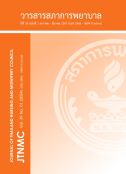The Lived Experiences of Cognitive Impairment in Older Adults
DOI:
https://doi.org/10.60099/jtnmc.v39i01.265864Keywords:
experiences, cognitive impairment, older adults, qualitative researchAbstract
Introduction Cognitive impairment is a common problem for older adults, arising from both common aging and premature dementia. The aging process often involves pathological changes, such as the death of nerve cells in various brain areas, leading to memory decline, reduced selfconfidence, stress, fear of dependency, diminished motivation in daily life, and a decline in social interactions among older individuals.
Objective To explore the experiences of cognitive impairment in the daily lives of older adults
Design A descriptive qualitative design
Methods The informants comprised individuals aged 60 years and above, residing in a sub-district within a central province in Thailand. A purposive sampling was employed to select 15 individuals who met the inclusion criteria. In-depth interviews were conducted at a mutually convenient time for each participant between May and October 2023. Data were analyzed using content analysis based on Sandelowski’s concept. The research’s trustworthiness was assessed through credibility, confirmability, and transferability.
Findings The experience of cognitive impairment in the daily life of the older adults can be summarized into three main themes: 1) forgetfulness, consisting of the recognition of forgetfulness, forgotten daily routine, and forgetfulness occurring outside the home, 2) emotional changes as a results of forgetfulness including irritability, anxiety and fear, and 3) management of forgetfulness, consisting of starting over, help from relatives, specifying the placement point, and doing activities.
Recommendations This study reveals that forgetfulness, emotional changes, and management of forgetfulness are significant experiences among the older adults. The healthcare team can use this information for collaborative planning with the families of older adults to screen, monitor, and provide cognitive-stimulating activities to delay dementia in the older adults.
Downloads
References
Chewasopit W. Aging society: The changed marketing factor. Journal of Mahachulalongkornrajavidayalaya University Nakhondhat. 2019;6(1): 38–54. Available from: https://so03.tci-thaijo.org/index.php/JMND/article/view/168865/129227 (in Thai)
Bunnag N. Before moving to ‘healthy ageing’, one must understand 10 facts of ‘ageing and health’ 2021. Available from: https://www.sdgmove.com/2021/02/11/10-facts-of-health-and-aging/
Langa KM, Levine DA. The diagnosis and management of mild cognitive impairment: a clinical review. JAMA. 2014;312(23):2551-61. https://doi.org/10.1001/jama.2014.13806 PMID: 25514304
Winblad B, Palmer K, Kivipelto M, Jelic V, Fratiglioni L, Wahlund LO, et al. Mild cognitive impairment--beyond controversies, towards a consensus: report of the International Working Group on Mild Cognitive Impairment. J Intern Med. 2004;256(3):240-6. https://doi.org/10.1111/j.1365-2796.2004.01380.x PMID: 15324367
Petersen RC, Doody R, Kurz A, Mohs RC, Morris JC, Rabins PV, et al. Current concepts in mild cognitive impairment. Arch Neurol. 2001;58(12):1985-92. https://doi.org/10.1001/archneur.58.12.1985 PMID: 11735772
Jonker C, Geerlings MI, Schmand B. Are memory complaints predictive for dementia? A review of clinical and population-based studies. Int J Geriatr Psychiatry. 2000;15(11):983-91. https://doi.org/10.1002/1099-1166(200011)15:11%3C983::aid-gps238%3E3.0.co;2-5 PMID: 11113976
Owokuhaisa J, Rukundo GZ, Wakida E, Obua C, Buss SS. Community perceptions about dementia in southwestern Uganda. BMC Geriatr. 2020;20(1): 135. https://doi.org/10.1186/s12877-020-01543-6 PMID: 32293301
Pavel A, Paun R, Matei V, Rosca A, Tudose C. Quality of life in people with subjective cognitive decline. Alpha Psychiatry. 2023;24(2):60-64. https://doi.org/10.5152/alphapsychiatry.2023.221007 PMID: 37144046
Wei YC, Huang LY, Chen CK, Lin C, Shyu YC, Chen YL, et al. Subjective cognitive decline in the community is affected at multiple aspects of mental health and life quality: a cross-sectional study of the community medicine of Keelung Chang Gung Memorial Hospital. Dement Geriatr Cogn Dis Extra. 2019;9(1):152-62. https://doi.org/10.1159/000497222 PMID: 31011329
Wattanawithukur, P. Memory impairment. The Alzheimer’s Disease and Related Disorders Association [cite 2024 Jan 4]; Available from: http://www.azthai.org/เกี่ยวกับสมองเสื่อม/2-ชนิดของสมองเสื่อม-1045-ภาวะความทรงจำบกพร่อง (in Thai)
Doyle L, McCabe C, Keogh B, Brady A, McCann M. An overview of the qualitative descriptive design within nursing research. J Res Nurs. 2020;25(5): 443-55. https://doi.org/10.1177/1744987119880234 PMID: 34394658
Lincoln YS, Guba EG. Naturalistic inquiry. Beverly Hills, CA: SAGE; 1985.
Sandelowski M. Whatever happened to qualitative description? Res Nurs Health. 2000;23(4): 334-40. https://doi.org/10.1002/1098-240x(200008)23:4%3C334::aid-nur9%3E3.0.co;2-g PMID: 10940958
Guba EG, Lincoln YS. Competing paradigms in qualitative research. In: Denzin NK, Lincoln YS, Eds. Qualitative research. Thousand Oaks: Sage Publications; 1994. p. 105-17.
Yodphet, S, Pattanasri, P, Sakdaporn, T. The elderly school: Knowledge set for developing potential elderly. Foundation of Thai Gerontology Research and Development institute. Bangkok: Mata Printing; 2017. Available from: https://www.thaihealth.or.th/?p=137198 (in Thai)
Johansson MM, Marcusson J, Wressle E. Cognitive impairment and its consequences in everyday life: experiences of people with mild cognitive impairment or mild dementia and their relatives. Int Psychogeriatr. 2015;27(6):949-58. https://doi.org/10.1017/s1041610215000058 PMID: 25644289
Imhof L, Wallhagen MI, Mahrer-Imhof R, Monsch AU. Becoming forgetful: how elderly people deal with forgetfulness in everyday life. Am J Alzheimers Dis Other Demen. 2006;21(5):347-53. https://doi.org/10.1177/1533317506292499 PMID: 17062554
Kansri, S, Yotthongdi, N, Booranarek, S. The effect of the brain exercise program applying neurobic exercise theory on depression among older adults with mild cognitive Impairment. Journal of Boromarajonani College of Nursing, Bangkok. 2018;34(3):65-76. Available from: https://he01.tci-thaijo.org/index.php/bcnbangkok/article/view/168625/121333 (in Thai)
Yen YC, Rebok GW, Gallo JJ, Jones RN, Tennstedt SL. Depressive symptoms impair everyday problem-solving ability through cognitive abilities in late life. Am J Geriatr Psychiatry. 2011;19(2):142-50. https://doi.org/10.1097/jgp.0b013e3181e89894 PMID: 20808123
Downloads
Published
How to Cite
Issue
Section
License
Copyright (c) 2024 The Journal of Thailand Nursing and Midwifery Council

This work is licensed under a Creative Commons Attribution-NonCommercial-NoDerivatives 4.0 International License.








